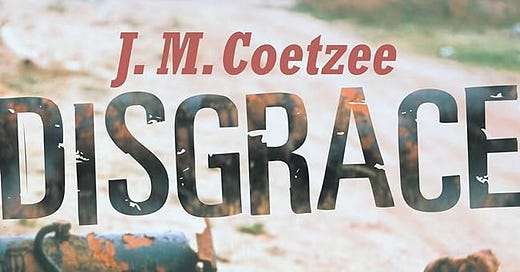Book Review: "Disgrace" by J.M. Coetzee
An emotionally stunted University professor resigns after his sexual encounter with a student. He escapes to the country to live with his daughter, where a consuming act of violence changes everything
WELL.
This is one of those books that you could study at college and write four different essays about. I'm sure that with each reading, I'll get something new out of it (and I will be reading it multiple times). This first reading, what stuck with me most were the parallels between David Lurie's "relationship" with his student and the violent attack on his daughter, Lucy.
(While I generally stay away from specific plot points or spoilers in my reviews, I am going to discuss key aspects of the plot in this one. TW for sexual assault and rape.)
First, I'd like to enter semantics for a moment. In the synopsis of Disgrace, Lurie's interactions with his student, Melanie, are described as "an impulsive affair", or even "a seduction". I'd assert that this is no relationship, affair, or understanding - he rapes her. By any measure of the current definition, Lurie forces himself on Melanie; she acquiesces because he is her professor and she is a young girl. In each of their meetings, Melanie is clearly uncomfortable, unwilling, and terrified - she very literally tells him no at one point. He describes her as being "passive" during the act. During the second time of the offense, Coetzee writes, "She does not resist. All she does is avert herself: avert her lips, averts her eyes". Describing Lurie's acts of rape as anything less than that is problematic, to say the least.
And yet, the euphemisms mirror his view of himself. He seems himself as unpopular yet inoffensive; he has no illusions that he is held in high regard by anybody, but also believes himself to be above reproof. His acceptance of his fate when he resigns is not because he feels any remorse or twinge of doubt about what he has done, but instead because he is too prideful to do exactly that. Lurie views the world, and the choices others make, as a reaction to himself. When women are unattractive, he judges them harshly on their inability to appeal to him. When his daughter is raped, Lurie takes it as a personal affront to him: why won't she confide in him? why won't she pursue her attackers? why does everybody keep saying he doesn't understand what she's going through when he very clearly knows what happened despite being in another room? why doesn't she leave the farm so he can stop worrying about her? In the macro, all of this is happening in a freshly post-apartheid society, which exacerbates the plights of the characters.
This isn't really a book you "enjoy"; it's a book you are shocked by. It's very well done, although I think we could have done without the Byron bits. I'm sure there's literary value there and was a very calculated decision on Coetzee's part, but let's face it: I'm not going to take the time to dig in on Byron to understand this book. I also wish the women in the novel were more fleshed out. While this book is an indictment on Lurie's inability to see women as beings in and of themselves, the book tended to treat them that way. Overall, however, Disgrace is one I'll come back to over the years to glean more insight from.





